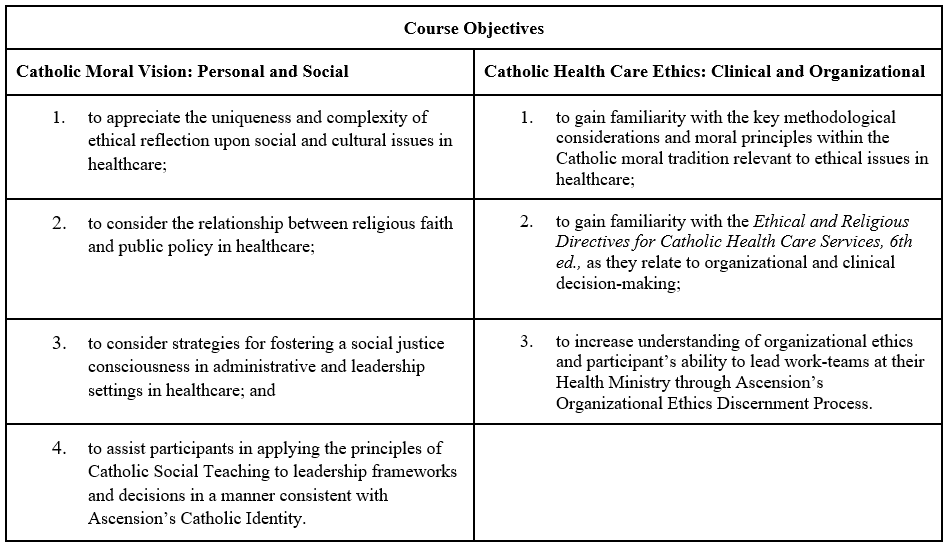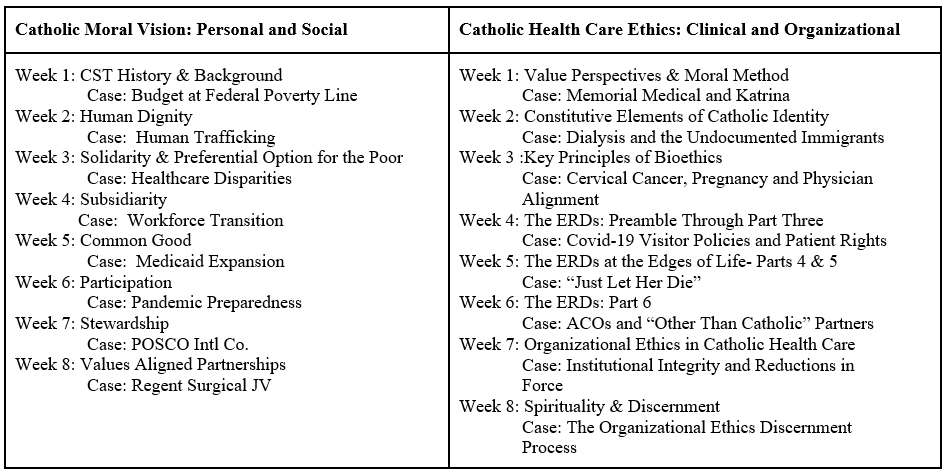Ascension's Executive Ministry Leadership (EML) Formation is designed to provide working executives with a combination of flexible, self-directed learning and highly interactive retreat experiences. Coursework covers a 12-month period, followed by a six-month practicum. There are a total of 18 retreat days over the duration of the program. Upon completion, it is hoped that participants become personally committed to practices and habits of spiritual reflection that foster deeper relationship with self, God, others, community and the world as part of their ongoing formation journey, and be professionally committed to the healing ministry and mission of Jesus with special attention to those who are poor and vulnerable.
Throughout the program, participants will develop skills and habits to integrate and practice Virtuous Servant Leadership while being in and building community. They will be able to articulate foundational principles from the Catholic theological, moral and spiritual tradition in order to communicate Ascension's Ministry Identity and our Mission while leading integrated strategic, operational, financial, clinical and organizational processes as a full expression of Ascension's identity as a ministry of the Church.1
Traditionally, the program is a blend of in-person retreats and virtual learning. The in-person retreats were adapted to the virtual setting during the pandemic. The five, nine-week courses include: "Mystery of God Who Calls" (Course 1); "Jesus: Mission & Ministry" (Course 2); "Mission and Ministry of the Church" (Course 3); "Catholic Moral Vision: Personal and Social" (Course 4); and "Catholic Health Care Ethics: Clinical and Organizational" (Course 5). Each of the courses is "bookended" by retreats designed to support ongoing formation and transition from course to course. The program culminates with an "integration project" which delineates an aspect of Catholic identity to be actualized in and through participants' leadership.
This year presented an opportunity to re-work Courses 4 and 5 of EML in order to seamlessly weave together Catholic Social Teaching, the principles of Catholic identity, and both organizational and clinical ethics. We aligned our course objectives in order to achieve this goal:

Our intention in structuring both courses collaboratively was to demonstrate how principles of Catholic Social Teaching such as human dignity, the common good, solidarity, subsidiarity, etc., form the foundation for clinical and organizational ethics, and are constitutive of our Ministry identity. In addition, we sought to make explicit connections to course content from one course to the other to help participants "connect the dots" within their own leadership roles and sphere of influence. The transition to an entirely virtual learning environment also required some pedagogical shifts: both courses integrated podcasts, used varying media platforms, video recordings to introduce course content, case studies and small group discussion boards. We also brought in guest facilitators with subject matter expertise in key content areas. The outline of both courses is provided below:

The feedback we received on the revised course formats and pedagogical approaches was quite positive. We began with the assumption that continuing the coursework in the Executive Ministry Formation program would be a significant additional burden for healthcare leaders already stretched thin and overwhelmed by the demands of responding to the Covid-19 pandemic. To our surprise, several participants commented that they felt "blessed" to be participating in EML during the pandemic, as it provided a structured community of support, and the content of the course was immediately applicable to the scenarios faced in their Ministry Markets. Topics such as equitable distribution of scarce resources, considerations for wage adjustments, application of the preferential option for the poor and vulnerable to care delivery models, stewardship of resources (space, staff, and stuff) and how our Catholic identity shapes our response to crises all had direct application to participants' daily lives, both personally and professionally. The EML community also became a "safe space" wherein participants could voice their concerns and frustrations, and ask the difficult questions facing Catholic healthcare and healthcare in general, in the midst of the pandemic.
Mark Repenshek, Ph.D.
Vice President, Ethics and Church Relations
Ascension
[email protected]
Matthew Kenney, Ph.D.
Vice President, Ethics Education and Integration
Ascension
[email protected]
Celeste Mueller, D.Min.
Vice President, Ministry Formation
Ascension
[email protected]
ENDNOTE
- Mueller, CD. Formation: Catholic Theology Alive in Catholic Healthcare. Incarnate Grace: Perspectives on the Ministry of Catholic Healthcare. Fr. Charles Bouchard, ed. 2017, Catholic Health Association St. Louis, MO, pp. 270-289.